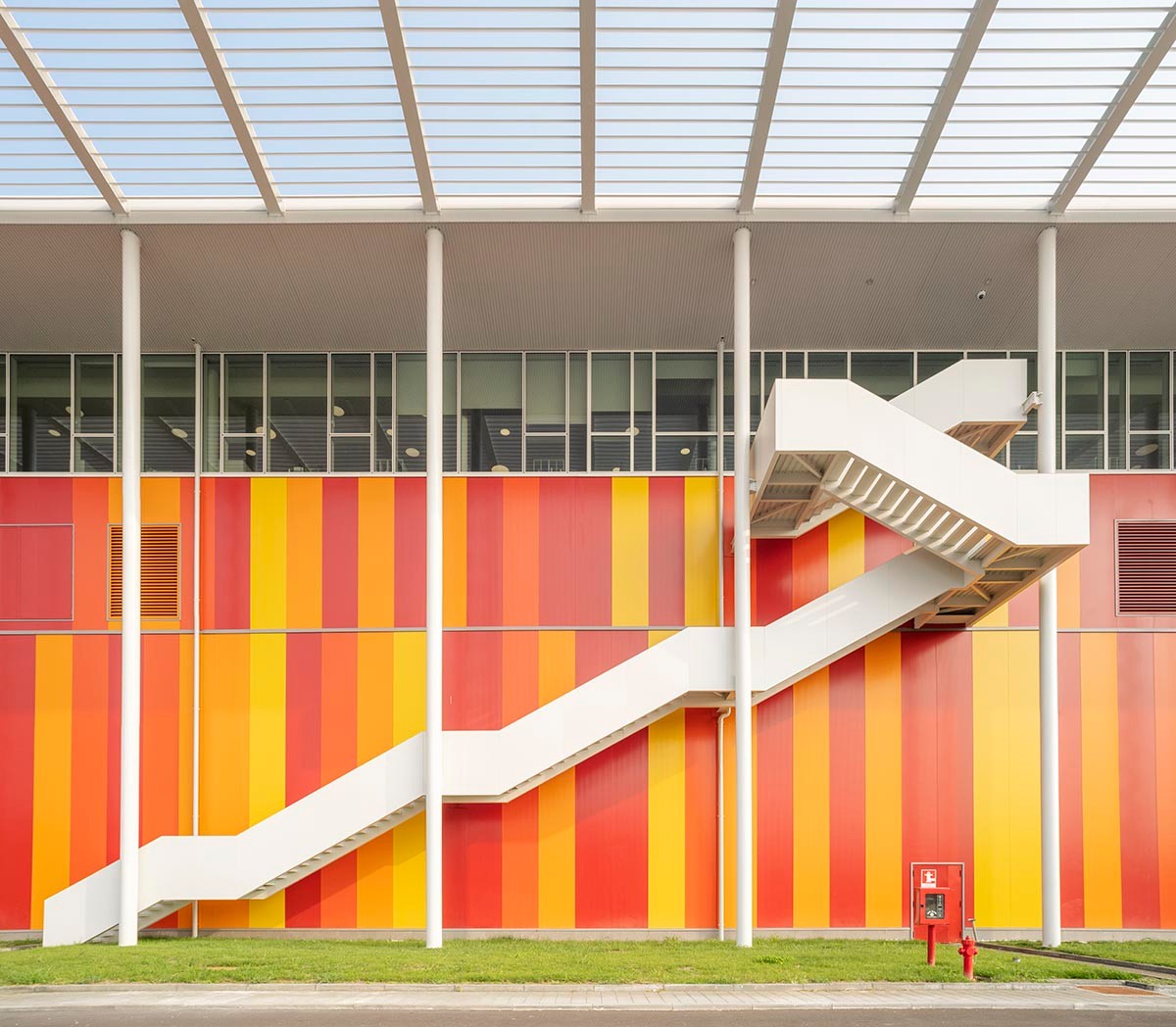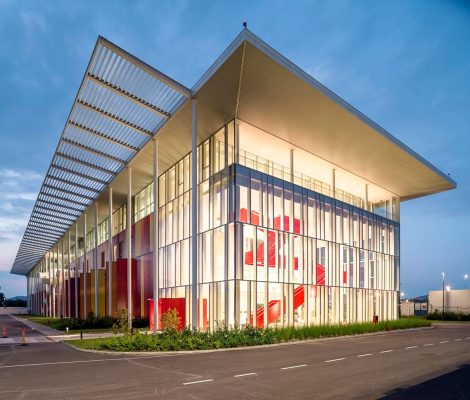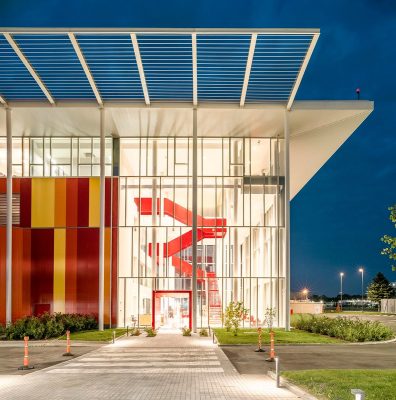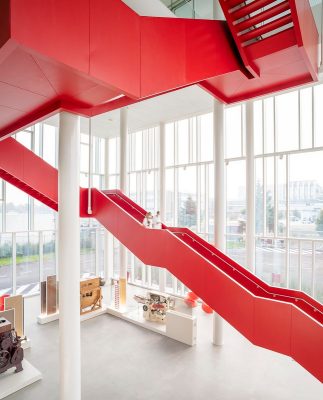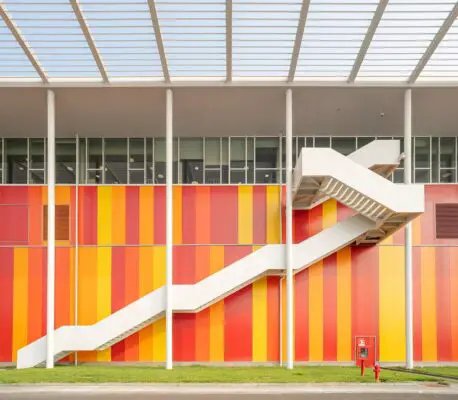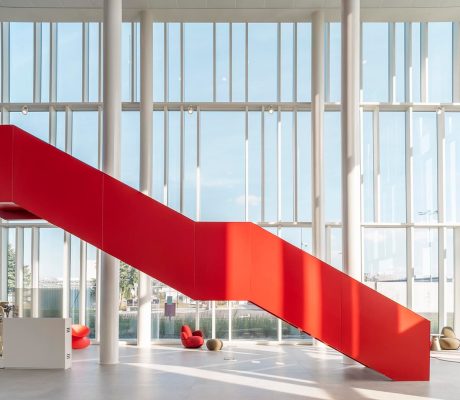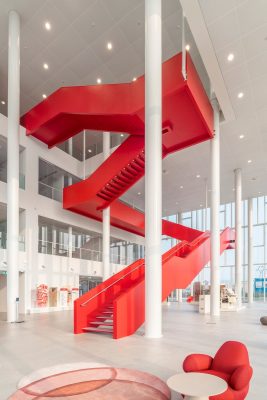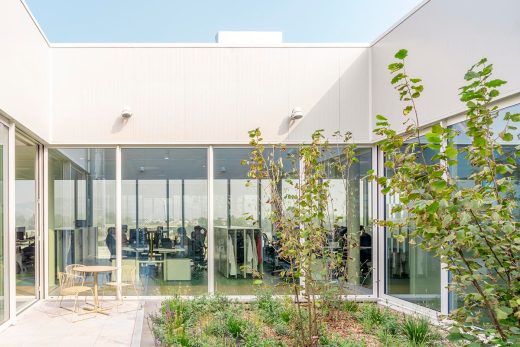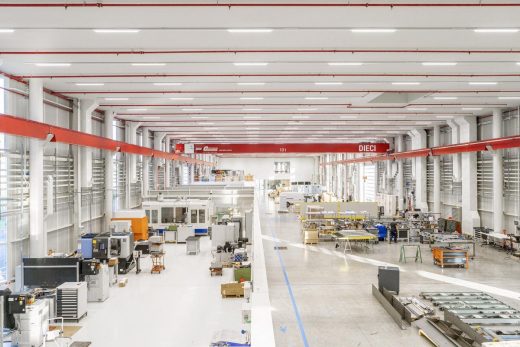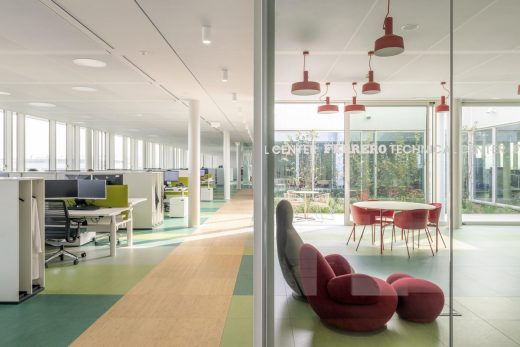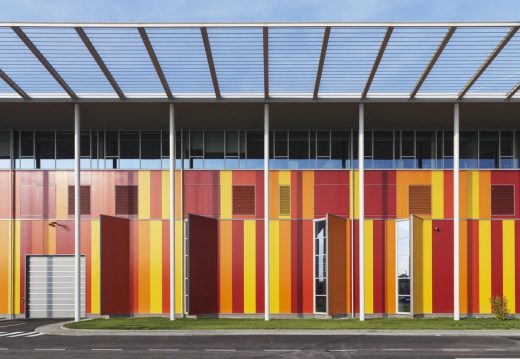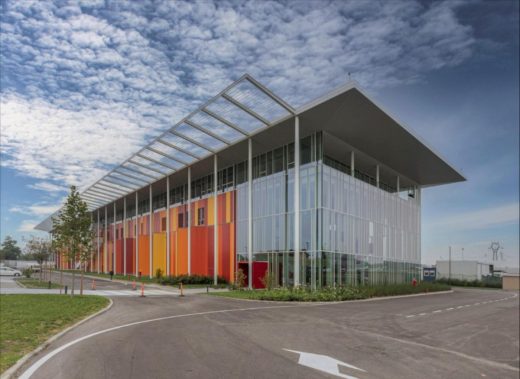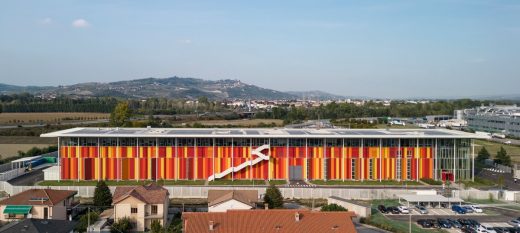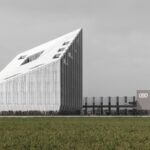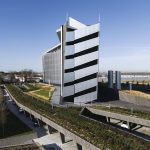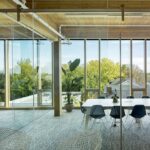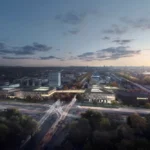Ferrero Technical Center Alba, Piedmont office building photos, Italian commercial property design
Ferrero Technical Center Alba Building
23 February 2023
Design: Frigerio Design Group
Location: Alba, Piedmont, northwestern Italy
Industrial architecture and natural landscape:
Ferrero group presents its new technical innovation center in Italy
Photos by Studio Campo unless noted otherwise
Ferrero Technical Center in Alba, Piedmont region
Designed by Frigerio Design Group, the Ferrero Technical Center is located in Alba, in the heart of the Langhe region. It represents a new level of integration between industrial architecture, natural landscape, sustainability of processes and well-being for workers.
Alba (Cuneo, Italy), January 2023 | The new technical innovation center for Ferrero, one of the largest chocolates and confectionery companies in the world (renowned for its brands such as Nutella, Kinder and Ferrero Rocher) is now at full speed. Designed by Frigerio Design Group, the Ferrero Technical Center represents a new frontier for industrial architecture in the name of total quality. Adhering to the standards of Industry 4.0, it focuses on automated and interconnected production, where people and machines work in unison, while respecting its ecosystem. Technology is always seamlessly integrated in a recognizable and reassuring architecture, bringing together the group’s corporate identity, history and know-how.
Following a competition by invitation held in 2017, it stems from the need to combine the company’s engineering operations, in particular those devoted to designing new production lines, with the workshop where they are preassembled and tested. An invaluable know-how that the company wanted to keep in Alba, Italy, a city intrinsically linked to its history and where its headquarter is located.
Frigerio Design Group followed its approach in slow architecture: projects, developed to ensure minor ecological impact, are long-lasting and draw on resources from the local context for their definition. Frigerio Design Group brought to life an iconic and reassuring architecture not only originating from the natural context, but actually connecting to it. The architecture is integrated in the surrounding environment and builds links with the most characteristic elements of the landscapes typical of the Langhe, an area designated by UNESCO as a world heritage site. Alba is also home to Ferrero’s largest Italian production site. An in-depth study of the area, in addition to factors such as the attachment to its territory, nature and colours gave inspiration to Frigerio Design Group’s architectural project, which reinterprets them through abstract geometries with the warm shades of an autumn landscape.
The new center supports management and operational functions and boasts a 12,700 sqm ecological building that is nZEB (nearly Zero Energy Building) and will host 200 employees. Simple and linear architecture conceals plants and technical equipment. The compact building maximizes all the passive space and minimizes the resources needed for operations and maintenance. The lower area houses production and the upper area is for office space. The areas are shared by using blind surfaces below and transparency above. Safety and sensorial comfort are key to the entire architecture.
The Architectural Project
Between land and sky, opacity and transparency are designed to emphasize functions to define the iconic architecture: The offices located on the last floor have transparent facades, whereas the lower floors containing the workshop and plants are hidden from view.
The main goal of the Ferrero Technical Center project was to give justice to different functions but closely related. The workshop for building the machinery for Ferrero manufacturing sites is placed on the ground floor together with all the operations related to their design, while nearly the entire upper floor is dedicated to various offices, both executive and operational, in addition to workspace, conference rooms and staff areas.
The huge lobby is glazed entirely. It is the reception area and staff entrance and concentrates the perception of the whole Ferrero universe into a single space. Inside there is a metal grand staircase in vibrant red that goes up like a “suspended walkway” offering an initial view over some of the operations at the core of the building. Overlooking the lobby are the enormous windows of the mezzanines, experimentation areas, conference rooms, office space for consultants, a lounge and changing rooms for staff.
All the technical areas and systems are integrated in the facades or hidden in the mezzanine, connecting its 3,300 sqm of design and production. The structure has a flat, jutting roof with a south-facing shade and sun-breaker portico with elliptical blades.
The 3,500 sqm workshop, with its open span of 25 m and length of over 100 m, is where the machinery is assembled. Its floorplan is essential and rectangular, white in colour, with its metalwork and architectural plant in full view. Openings in the facade capture natural light and air while shading direct sunlight, thereby reinterpreting the typical industrial shed, which could not be achieved here due to the building’s layered construction: The architect Enrico Frigerio defines them as “gills”, actual features that enable the building to breathe. Perimeter infill panels around the industrial building have a micro-perforated and sound-absorbing surface in order to improve the quality of the workspace and reduce noise pollution.
Office space
Comfort working: these are the keywords used by the architect to sum up the project for the offices, with emotional space, where the five senses are stimulated by the pursuit of the right comfort zone. The materials and colours replicate the nature surrounding the building, making the offices an actual “raised landscape”. A series of green patios, the architect calls “hanging gardens”, are placed at the center of the large open space to provide a bioclimatic, acoustic and aesthetic function.
They also improve sensorial quality and natural light while at the same time integrating moments of relaxation and encounters for staff, taking the inner space closer to the outdoors, also through its huge opening towards the landscape. The office space, located on the last floor, extends over an open space of 4,100 sqm. It holds conference rooms, private areas and relaxation space enabling workers to use ergonomic stations overlooking the landscape. The areas are characterised by glazing and modular openings, continuous and transparent. There are few fixed elements and the geometries are coordinated to provide maximum flexibility.
The architect, Enrico Frigerio, chose to remove wastepaper baskets from individual stations in order to ensure an efficient and centralised system to recycle paper that makes employees proactive and aware of how easy it is to recycle. The interior design develops from the colour green as the key element, which is present in three different hues: on the linoleum floors, alternated with bamboo wood, and in the series of open and hanging gardens linked together by recalling the raw materials used by Ferrero. The spaces were designed by Frigerio Design Group to meet the needs of people and their comfort.
They absorb natural light and air and were designed keeping in mind the benefits of biophilia, using green also as a system to regulate the microclimate and placing coffee plants and hazelnut and pomegranate trees. The project gave life to a “landscape” for interior and exterior spaces both for work and for encounters between staff. Sustainability is at the service of design in a workspace able to ensure maximum comfort and well-being for the people located there.
Environmental sustainability
Bioclimatic and nZEB (nearly Zero Energy Building), the building was designed to lower carbon dioxide emissions to a minimum. The building is compact, dry-assembled industrial material is used in its construction. It maximises all passive input (light, air and sunlight) and keeps to a minimum the resources needed for operations and maintenance, while at the same time contributing to its clear and individual identity.
A photovoltaic system is installed on the roof that generates up to 300 kW peak. A series of counterposed openings makes it possible to provide natural ventilation during mid-seasons. The offices are air conditioned with ceiling radiant systems, running at 40° instead of the standard 70°. A sound-absorbing system is used to further enhance the comfort of interiors. A smart lighting system is used in the parking areas to lower light pollution. It ensures the lights are on only in the presence of traffic.
Ferrero Technical Center Alba, Piedmont Building, Italy – Building Information
Location: Alba, (CN) Italia
Client: FERRERO group
Competition: 2017
Executive: 2018-2019
Construction: 2022
Surface area: Lot 14.500 sqm, Building 12.700 sqm, Parking 4.100 sqm
FRIGERIO DESIGN GROUP
General coordination, Architectural Design PFTE, PD, PE, Planning permits, Interior design, Artistic supervision
Collaborators: E. Frigerio with C. Ginocchio (project leader), S.Rota, S. Stevanè, D. Bona, M. Verdona, F. Valido, A. Alessi, A. Chiappini
Structures
Structural design PFTE, PD, PE: Redesco Progetti – M.E. Giuliani, F.Inzaghi
MEP: Ariatta Ingegneria dei Sistemi – A.Ariatta, G.Ariatta, C.Zeni, M.Zoppo Vigna
BIM Manager: M.Gobbi
Gardens: AG&P greenscape / E. Bortolotti
Fire prevention and safety plan: C. Manfreddo
Geology: O. Costagli
Plumbing: S. Sordo
Acoustics: E. Bocca
Construction supervision: e CSE
Recchi Engineering: P.Porporato, G. Parnisari, M.Durbano, F. Rubini, M. Rubini
General Contractor: Co.Ge.Fa.
Project Manager and Site Manager: G. Forte
Site Manager: A. Sega
On-site technical support: P. Masci
Rendering: Courtesy of Frigerio Design Group
Photographs: A. Positano e G. Cambiaggi | Studio Campo, E. Cano
Frigerio Design Group
FRIGERIO DESIGN GROUP – www.frigeriodesign.it
Born in Turin, Enrico Frigerio graduated from the University of Genova with a degree in Architecture and went on to become a part of Renzo Piano’s workshop, where he worked alongside Mr. Piano and learned the trade. In 1991, he founded Frigerio Design Group and made quality and the environment its primary objective.
Some of his most significant projects include: the ecological stands at the Ferrari racetrack in Imola (1992), the Sambonet headquarters in Orfengo (2004), power plants for the Swiss group AXPO (2008) the Ferdeghini sports center for Spezia Calcio (2013), the new Terna substation in Capri (2018), the headquarters for Crèdit Agricole Green Life (2018) in Parma, the Zamasport headquarters in Novara (2020), a residential complex in Saronno (2020), the Ferrero Technical Center in Alba (2022) and the refitting of the Rosenthal offices in Selb, Germany (2022). Current projects under completion include the energy transition of the ENEL power plant in Fusina and the eco-sustainable residential complex ALBÒRA in Genoa.
Ferrero Technical Center Alba, Piedmont Building images / information received 230223
Previously on e-architect:
3 September 2021
Ferrero Technical Center, Alba
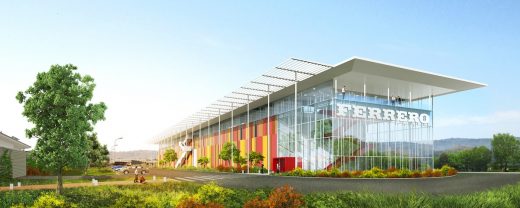
image courtesy of architects practice
Ferrero Technical Center Alba
Location: Alba, Piedmont, north Italy, southern Europe
Another Italian building design by Frigerio Design Group on e-architect:
Enel power plant in Venice, Venice, northern Italy
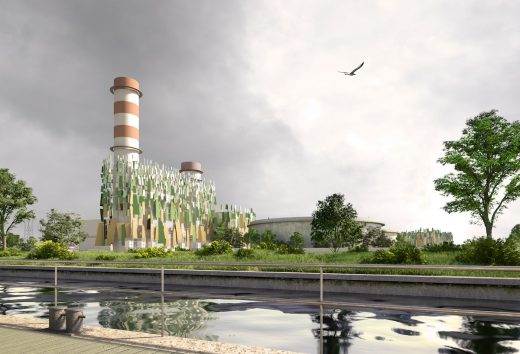
image courtesy of architects practice
Enel power plant in Venice
Italian Architectural Designs
Italian Building Designs
Italian Architecture Design – chronological list
Architects: Aymeric Zublena of Scau Architecture with Ugo and Paolo Dellapiana of Archicura and Ugo Camerino
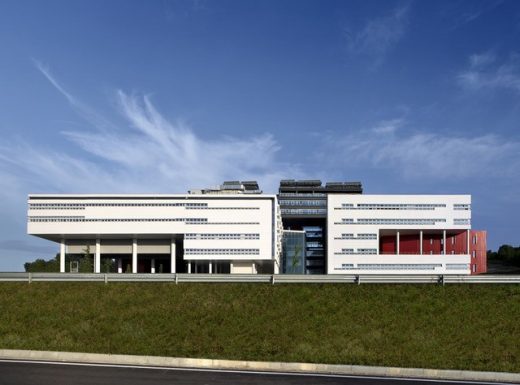
photo : Barbara Corsico
Hospital Michele & Pietro Ferrero, Verduno
Antonianum Merano, South Tyrol, North Italy
Design: Delugan Meissl Associated Architects (DMAA)
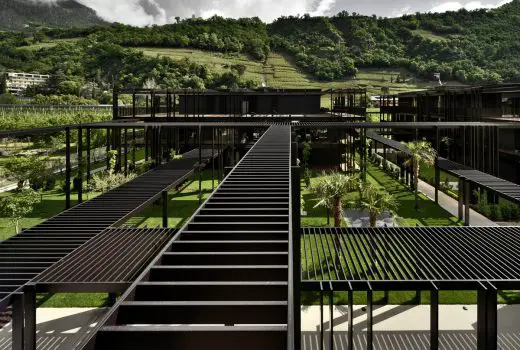
photo : Oskar Da Riz
Antonianum Merano, South Tyrol housing
Markas Headquarters, North Italy
Design: ATP Architects Engineers
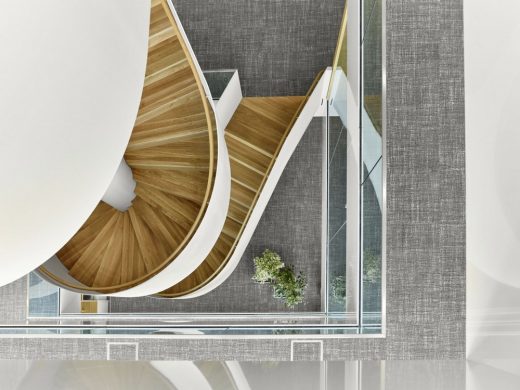
photography : ATP/Becker
Markas Headquarters in Bolzano
Comments / photos for the Ferrero Technical Center Alba, Piedmont Building design by Frigerio Design Group page welcome

